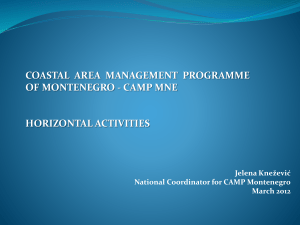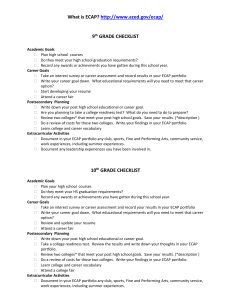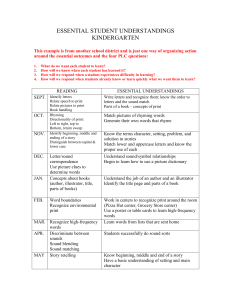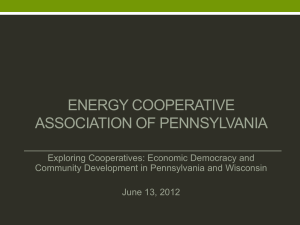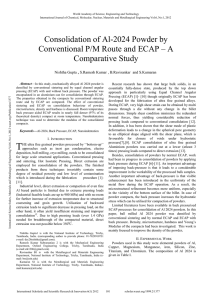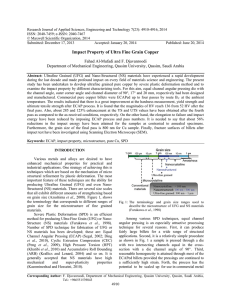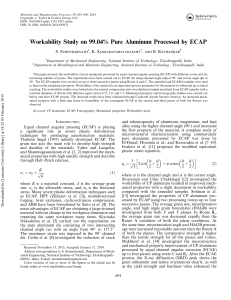ECAP - SFI Environmental Login
advertisement
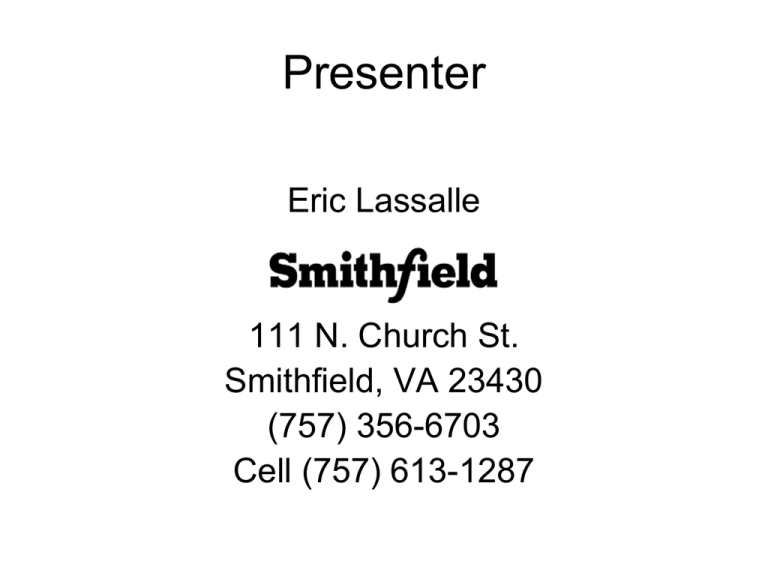
Presenter Eric Lassalle 111 N. Church St. Smithfield, VA 23430 (757) 356-6703 Cell (757) 613-1287 What is ECAP? • Environmental Compliance Assessment Program (ECAP) • Third Party Audit • Team – Smithfield Foods, Inc. – Hunton & Williams, LLP – Third Party Compliance Assessor ECAP Focus Areas 1. 2. 3. 4. 5. 6. 7. 8. 9. 10. 11. 12. 13. Wastewater Storm Water Drinking Water Water Rights Air RCRA Non-hazardous, Hazardous and Universal Waste Community Right-to-Know Material Management FIFRA Pesticides Polychlorinated Biphenyl (PCB) Materials Asbestos - Disposal Superfund Wetlands 14. Lead-based Paint 15. Groundwater Monitoring and Underground Injection Wells 16. Risk Management Planning 17. Medical Waste 18. Spill Prevention Control and Countermeasure (SPCC) Planning 19. OSHA’s Hazardous Waste Operations Requirements 20. Regulated Refrigerant (CFC/HCFC) Management 21. Environmental Management System Practices 22. Facility, Food & Bio Security 23. Greenhouse Gases Why ECAP? • Assess Compliance Status – Find and correct non-compliance – Implement best practices • Benchmark Performance • Training Mechanism • Goal – 100% Compliance, 100% of the Time! When – ECAP Cycle • Year 1 – ECAP • Year 2 & 3 – OFF • Year 4 – ECAP Schedule may be adjusted by Smithfield Foods, Inc. for extenuating circumstances. ECAP Process • Pre-Assessment Questionnaire • Site Visit • Final draft of Finding & Recommendations • Report & Score (for internal use only) • Follow-up (provided as needed) ECAP Scoring Areas Each facility is scored based directly on the number and priority of findings Scores from Each Section % of Score I. Wastewater 2.0/4.0 50% II. Storm Water 1.0/4.0 25% III. Drinking Water & Water Rights 4.0/4.0 100% IV. Air and Regulated Ref. Management 3.0/4.0 75% V. RCRA, Superfund, & PCB 2.0/4.0 50% VI. Community Right-to-Know 3.0/4.0 75% VII. Material Storage & SPCC 1.0/4.0 25% VIII. Asbestos 2.0/4.0 50% IX. Risk Management Plan 4.0/4.0 100% X. Miscellaneous 3.0/4.0 75% 2.5/4.0 63% a. Wetlands and waterways b. Lead-based paint c. Groundwater monitoring d. Medical waste e. OSHA's Haz. Wst. Op. Requirements f. FIFRA Average Facility Score: ECAP Scoring Criteria 4 Absence of any priority A, B or C findings. 3 Absence of any priority A and not more than one priority B findings. 2 At least one priority A finding and/or more than one priority B findings. 1 More than one priority A finding, or at least one significant priority A finding (e.g., missing permit or plan; reportable violation(s)). Mean ECAP Score FY03-FY11 SMITHFIELD 100 90 80 JOHN MORRELL 70 60 FARMLAND FOODS 50 40 30 MURPHY-BROWN 20 10 0 FY03 FY04 FY05 FY06 FY07 FY08 FY09 FY10 FY11 OTHER SUBSIDIARIES TOP 10 FINDINGS #1. SPILL PREVENTION CONTROL & COUNTERMEASURE (SPCC) UPDATE & IMPLEMENT TRAINING RECORDKEEPING DEVELOP & IMPLEMENT SPILLED MATERIALS INSPECTIONS & TESTING #2. STORMWATER (SW3P) UPDATE & IMPLEMENT FOLLOW PERMIT REQUIREMENTS BEST MANAGEMENT PRACTICES (BMP’s) TRAINING INSPECTIONS RECORDKEEPING DRAWINGS #3. COMMUNITY RIGHT TO KNOW (EPCRA) INACCURATE REPORTING MISSING RECORDS REVISE DESIGNATE EMERGENCY COORDINATOR #4. RISK MANAGEMENT PLAN UPDATE & IMPLEMENT PROCESS HAZARD ANALYSIS (PHA’s) TRAINING RECORDKEEPING COMPLIANCE AUDIT STANDARD OPERATING PROCEEDURES (SOP’s) #5. AIR INCONSISTENT PERMIT FOLLOW PERMIT REQUIREMENTS OPACITY LACKS PERMIT/REGISTRATION TRAINING RECORDKEEPING REPAIR & MAINTAIN EQUIPMENT o REGULATED REFRIGERANTS #6. WASTEWATER FOLLOW PERMIT REQUIREMENTS UPGRADE & REPAIR NEED PERMIT SYSTEM DRAWINGS PROCEEDURES ACCIDENTAL RELEASE/SLUG CONTROL PLANS #7. RESOURCE CONSERVATION & RECOVERY ACT (RCRA) WASTE CHARACTERIZATION MANAGE & PROPERLY DISPOSE LABELING & DATING FLOURESCENT LAMPS TRAINING RECORDKEEPING PERMITS/REGISTRATION CORPORATE POLICY #8. MATERIAL MANAGEMENT PERMIT/REGISTRATION (Tanks) LABELING SPILLED MATERIALS PARTS WASHERS TRAINING & RECORDS #9. USED OIL NOT LABELED IMPROPERLY STORED #10 Universal Waste NOT LABELED IMPROPERLY STORED Follow Permit Requirements HOW TO PASS! 1. UPDATE & IMPLEMENT PLANS 2. TRAIN, RE-TRAIN & DOCUMENT 3. READ YOUR PERMITS & PLANS (e.g., NPDES, Pretreatment, AIR Permits, SPCC Plan or SW3P) and understand WHAT, WHEN, WHO, & HOW is required! 4. IMPLEMENT & MAINTAIN Stormwater BMP’s 5. Maintain, Document, Communicate & VERIFY!!! – – Keep detailed and organized files Communicate – no surprises, ask for help, follow-up Thank You! Questions? Comments?

